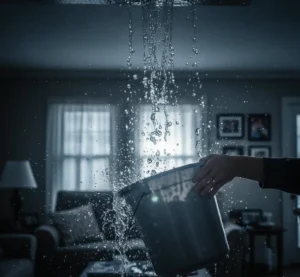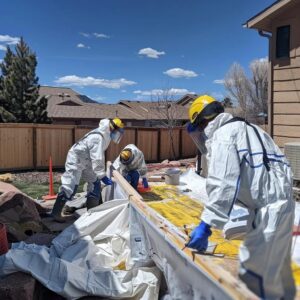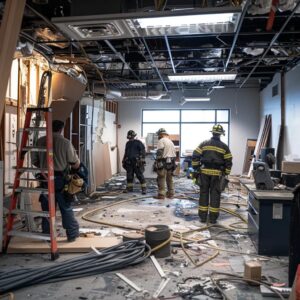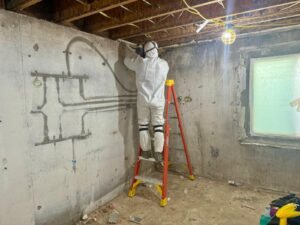Picture this: You’re heading downstairs to grab something from storage when your foot splashes into an inch of murky water covering your basement floor. Your heart sinks as you realize everything you’ve stored down there – family photos, holiday decorations, important documents – is now sitting in contaminated water.
If you’re a Denver homeowner, this scenario isn’t just possible; it’s increasingly common. Between our unpredictable weather patterns, aging infrastructure, and unique geological challenges, Front Range basements face flooding risks that many homeowners don’t fully understand until it’s too late.
The good news? Most basement flooding is preventable when you know what to look for and take action before disaster strikes. In this comprehensive guide, we’ll walk you through the five most critical causes of basement flooding in Denver homes and show you exactly how to protect your property, your belongings, and your family’s safety.
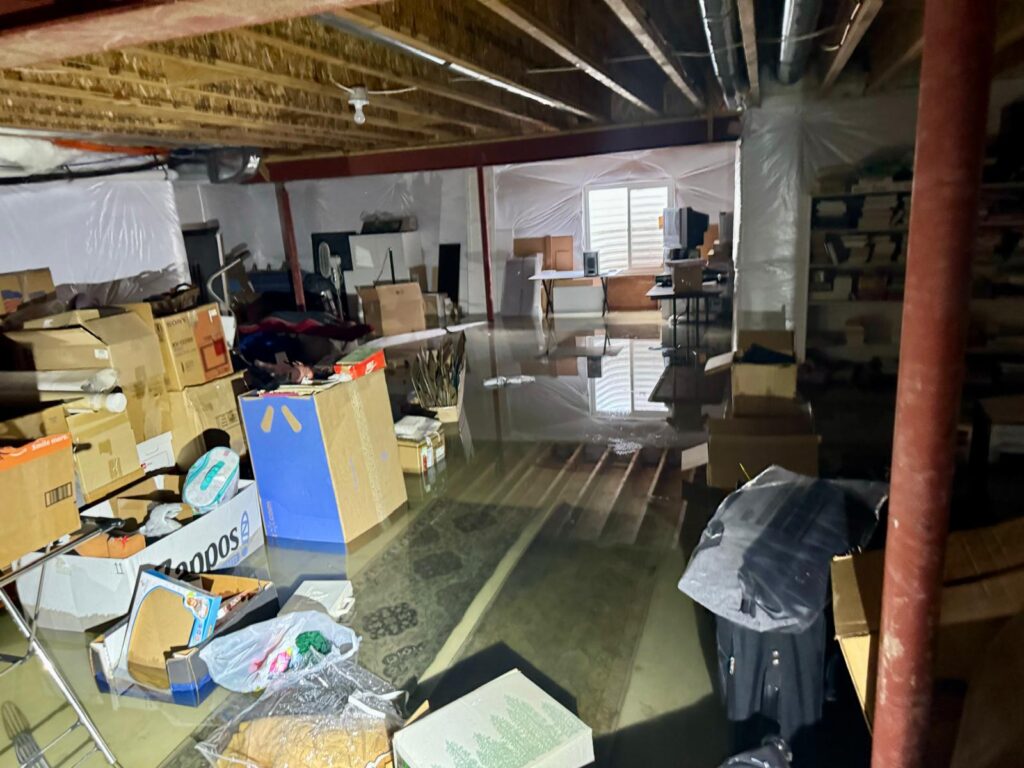
The Hidden Threat Beneath Your Denver Home: Why Basement Flooding Happens Here
Colorado’s Unique Flooding Challenges
Denver’s location presents a perfect storm of basement flooding risks. Our rapid spring snowmelt sends massive amounts of water rushing through neighborhoods, often overwhelming drainage systems that weren’t designed for such volume. Unlike coastal areas with predictable seasonal patterns, Colorado’s weather can shift from drought to deluge in hours, catching homeowners off guard.
The Front Range’s clay soil creates another layer of complexity. This dense, expansive soil acts like a sponge during wet periods, holding water against your foundation for extended periods. When it finally dries out, it shrinks and cracks, creating new pathways for water to reach your basement during the next storm.
Add to this our region’s significant temperature swings – it’s not uncommon to see 50-degree temperature differences in a single day – and you have conditions that stress building materials and create vulnerabilities that simply don’t exist in more stable climates.
The Real Cost of Ignoring the Warning Signs
The average basement flooding incident in Denver costs homeowners between $10,000 and $50,000 in repairs and replacement costs. But the financial impact is just the beginning. Contaminated floodwater can carry bacteria, sewage, and chemicals that pose serious health risks to your family, especially children and elderly residents.
Perhaps most frustrating for homeowners is discovering that their insurance may not cover flood damage. Many standard homeowner’s policies exclude flooding, leaving families to shoulder the entire financial burden of cleanup and repairs. This is why prevention isn’t just smart – it’s essential for protecting your financial future.
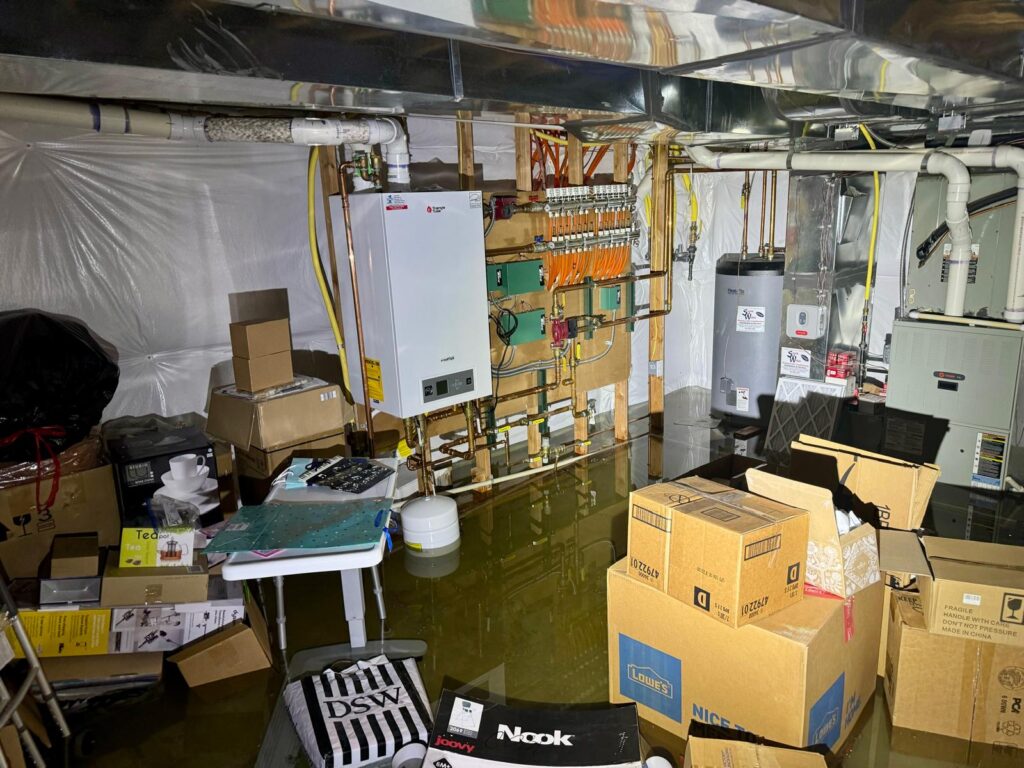
Problem #1: When Mother Nature Overwhelms Your Home’s Defenses
Denver’s Drainage Dilemma
Spring in Denver brings beautiful weather and devastating potential for basement flooding. As temperatures rise and mountain snowpack melts, the volume of water flowing through our drainage systems can increase by 300-400% virtually overnight. This rapid influx overwhelms storm drains, causes water to pool around foundations, and creates hydrostatic pressure that forces water through even the smallest foundation cracks.
Summer thunderstorms present their own challenges. Denver’s intense afternoon storms can dump inches of rain in minutes, creating flash flooding conditions that turn streets into rivers and yards into lakes. When your property’s drainage system can’t handle this volume, water finds its way to the lowest point – your basement.
Poor surface water management around your home compounds these natural challenges. If your yard slopes toward your house instead of away from it, every rainstorm and snowmelt becomes a direct threat to your basement’s integrity.
Quick Fix vs. Professional Solutions
What you can do immediately:
- Ensure your gutters and downspouts are clear and directing water at least 10 feet from your foundation
- Check that your yard slopes away from your home at a minimum grade of 6 inches over 10 feet
- Install window well covers to prevent water accumulation around basement windows
When to call professionals: If you notice pooling water around your foundation after storms, or if your basement has flooded before, it’s time for professional intervention. Comprehensive drainage solutions including French drains, sump pump systems, and landscape grading require expertise and equipment that most homeowners don’t possess.
Problem #2: Your Foundation’s Silent Cry for Help
Spotting Foundation Vulnerabilities Before It’s Too Late
Your foundation works silently and tirelessly to keep water out of your basement, but Denver’s clay soil and weather extremes take their toll. Small cracks that seem harmless can become major entry points for water during heavy rains or rapid snowmelt.
Look for these warning signs: hairline cracks in basement walls, white chalky deposits (efflorescence) on foundation walls, or musty odors that suggest moisture infiltration. In Denver’s clay soil, you might also notice stair-step cracks in exterior foundation walls, which indicate settling or soil movement.
The freeze-thaw cycle that’s common in Colorado can expand existing cracks, turning minor issues into major problems. What starts as a small crack can become a significant breach that allows gallons of water into your basement during the next storm.
DIY Prevention vs. Professional Intervention
Safe homeowner maintenance:
- Seal small cracks (less than 1/8 inch) with appropriate masonry sealers
- Apply waterproof coatings to interior basement walls
- Install dehumidifiers to control moisture levels
- Ensure proper ventilation to prevent condensation
When foundation repair is essential: Cracks wider than 1/4 inch, horizontal cracks, or cracks that are actively leaking require immediate professional attention. These issues often indicate structural problems that DIY solutions can’t address. Delaying professional repair typically results in more extensive damage and higher costs.
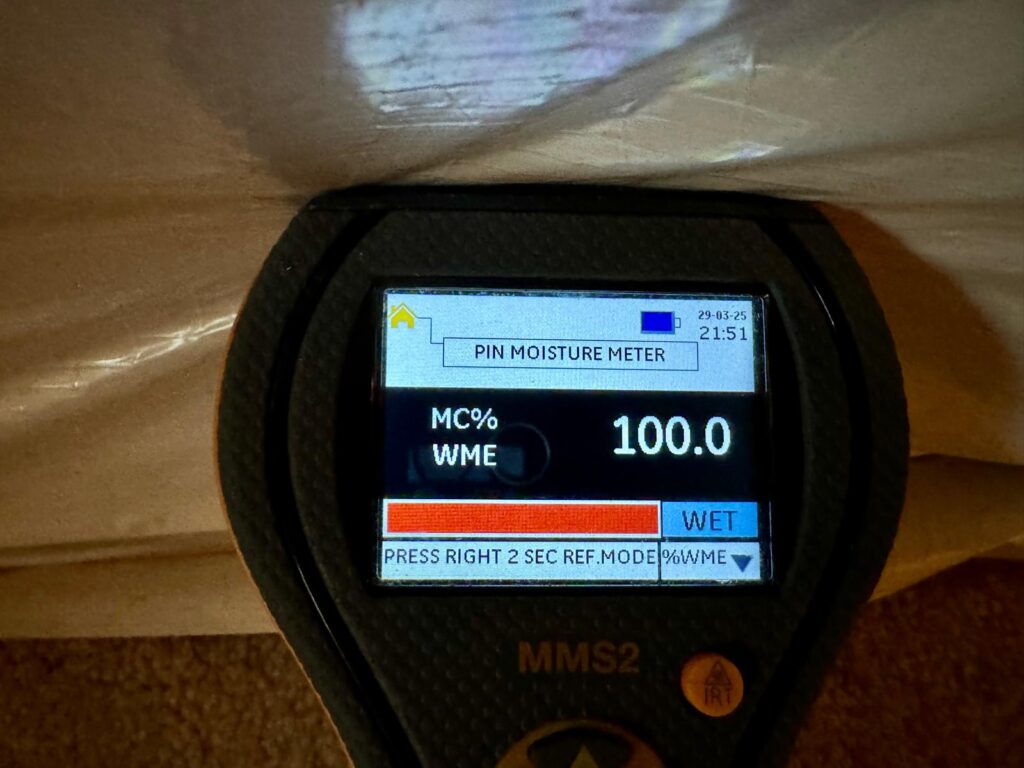
Problem #3: The Sewer Backup Nightmare That Strikes Without Warning
Understanding Denver’s Aging Sewer Infrastructure
Many Denver neighborhoods rely on combined sewer systems that handle both sewage and stormwater. During heavy rains, these systems can become overwhelmed, causing sewage to back up into homes through basement drains, toilets, and floor drains. This creates not just water damage, but a serious health hazard that requires professional remediation.
Tree root infiltration is another major issue in Denver’s established neighborhoods. Our beautiful mature trees can send roots seeking water directly into sewer lines, creating blockages that cause backups during normal use, not just during storms.
Municipal overload during heavy rains affects entire neighborhoods simultaneously. When the city’s system can’t handle the volume, sewage backs up into the lowest points – often basement drains and bathrooms.
Protection Strategies That Actually Work
Immediate protection measures:
- Install backflow preventers on all basement drains and toilets
- Avoid flushing non-degradable items like wipes or feminine products
- Have your sewer line professionally inspected and cleaned every 2-3 years
- Consider installing a basement bathroom ejector pump if you have below-grade plumbing
Professional preventive maintenance: Regular sewer line camera inspections can identify tree root intrusion or pipe deterioration before they cause backups. Professional drain cleaning removes buildup that can contribute to blockages during high-volume periods.
Problem #4: When Your Home’s Plumbing Becomes Your Worst Enemy
The Domino Effect of Neglected Plumbing
A single failed washing machine hose can release hundreds of gallons of water into your basement in just minutes. These rubber hoses typically last 3-5 years, but many homeowners forget to replace them until failure occurs. When they burst, they continue flowing until someone discovers the problem or the water supply is shut off.
Water heater failures are another common cause of basement flooding. Most water heaters last 8-12 years, but they often fail without warning. A catastrophic failure can release 30-50 gallons of water instantly, with more flowing if the supply line isn’t quickly shut off.
Burst pipes during Denver’s cold snaps create immediate flooding emergencies. When pipes freeze and expand, they can burst when temperatures rise and water flow resumes. The resulting flood can cause extensive damage within hours.
Proactive Maintenance That Prevents Catastrophe
Regular inspection schedule:
- Check washing machine hoses every six months for bulges, cracks, or corrosion
- Test water heater relief valves annually and replace units showing signs of corrosion
- Insulate pipes in unheated areas and know where your main water shut-off valve is located
- Replace washing machine hoses every 3-5 years regardless of appearance
Professional plumbing assessments: Annual plumbing inspections can identify potential failures before they occur. Professional plumbers can spot warning signs that homeowners miss and recommend preventive replacements that cost far less than emergency repairs and flood cleanup.
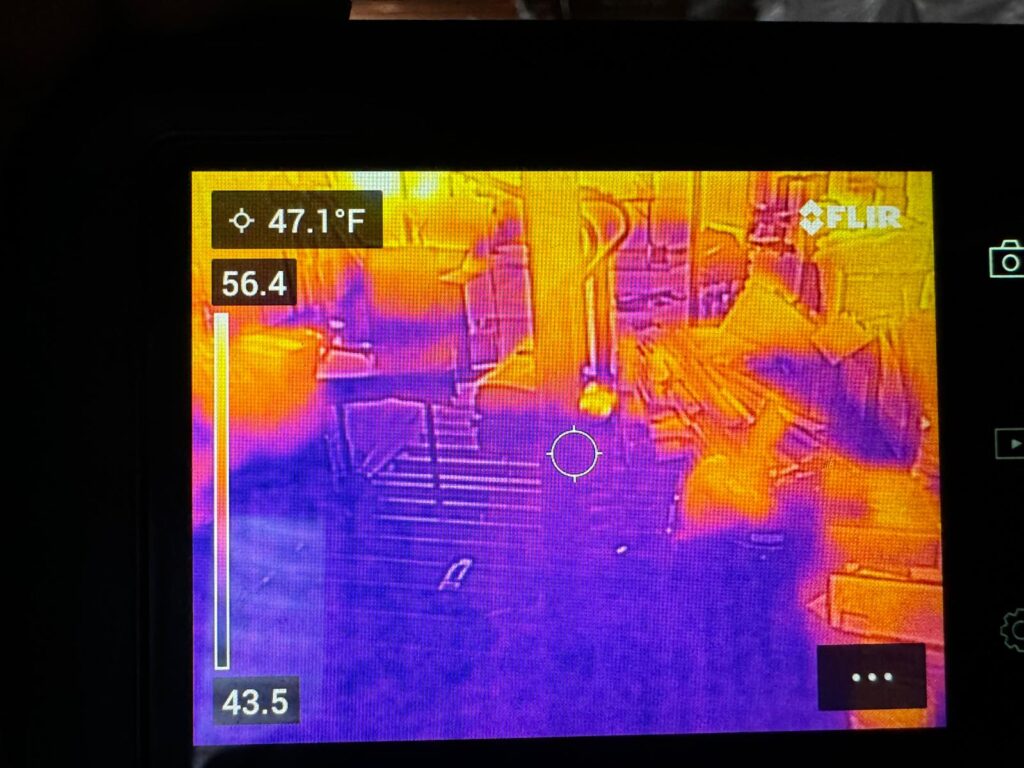
Problem #5: Sump Pump Failures That Leave You Defenseless
Why Denver Basements Need Reliable Sump Systems
Many Denver homes sit in areas with high groundwater tables, especially during spring snowmelt. A properly functioning sump pump system is often the only thing standing between your basement and a flood. These systems work around the clock during wet periods, pumping water away from your foundation before it can enter your basement.
Seasonal water table fluctuations can overwhelm undersized or poorly maintained sump pumps. Power outages during storms – when you need your sump pump most – can leave your basement vulnerable to flooding just when the risk is highest.
Ensuring Your Sump Pump Won’t Fail When You Need It Most
Testing and maintenance protocols:
- Test your sump pump monthly by pouring water into the pit until the pump activates
- Clean the pit and pump intake screen seasonally to prevent clogging
- Ensure the discharge pipe directs water well away from your foundation
- Keep a backup pump and basic repair tools on hand
Professional installation benefits: Professional sump pump installation includes proper sizing for your home’s specific needs, battery backup systems for power outages, and alarm systems that alert you to pump failures. Many homeowners discover their DIY sump pump installation is inadequate only when it fails during a flood.
Why Denver Basements Flood: The Hidden Threat Explained
The First 24 Hours: Critical Steps to Minimize Damage
Safety first – never enter a flooded basement until:
- Electricity to the basement is shut off at the main breaker
- You’re wearing rubber boots and protective equipment
- You’ve determined the water source and whether it contains sewage or chemicals
Immediate water removal strategies:
- Contact professional water removal services immediately – time is critical
- Document everything with photos for insurance claims before moving items
- Remove standing water as quickly as possible to prevent further damage
- Begin drying process immediately with fans and dehumidifiers
Why DIY Cleanup Often Makes Things Worse
Water damage extends far beyond what you can see. Moisture trapped in walls, insulation, and flooring creates ideal conditions for mold growth, which can begin within 24-48 hours. Professional water damage restoration teams have moisture detection equipment and industrial drying systems that ensure complete moisture removal.
Structural damage assessment requires professional expertise. What appears to be minor water damage may indicate significant structural problems that compromise your home’s safety and value.
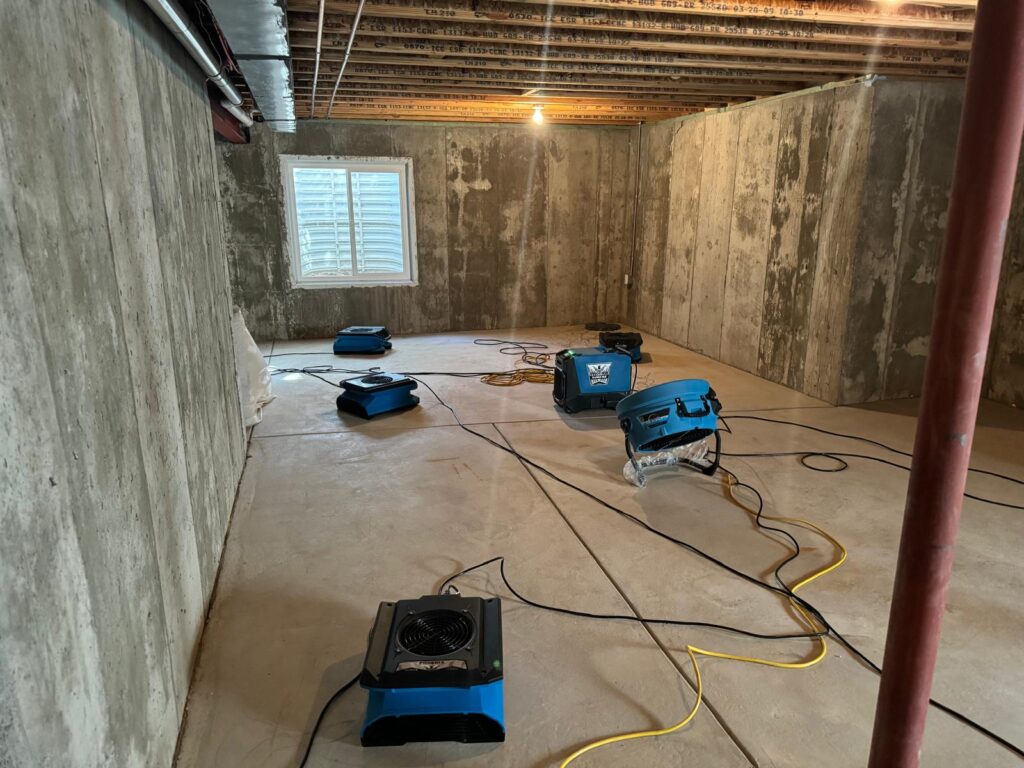
Don’t Wait for the Next Storm: Protect Your Denver Home Today
Basement flooding isn’t a matter of if, but when, for many Denver homeowners. The combination of our unique climate, aging infrastructure, and geological challenges creates risks that require proactive prevention and professional expertise.
Whether you’re dealing with the aftermath of a flood or want to prevent one from happening, professional restoration services provide the expertise, equipment, and emergency response capabilities that protect your home and family.
Take action today:
- Schedule a free basement flooding risk assessment
- Implement the preventive measures outlined in this guide
- Establish a relationship with a trusted restoration company before you need emergency services
- Review your insurance coverage and consider flood insurance if you don’t have it
For immediate help or emergency restoration services in Denver and surrounding areas, contact our certified restoration specialists at (720) 602 6746. We’re available 24/7 because disasters don’t wait for business hours.
Don’t let the next storm catch you unprepared. Your basement’s protection starts with understanding these five critical causes and taking action before water finds its way inside. Your home, your belongings, and your family’s safety depend on the decisions you make today.

